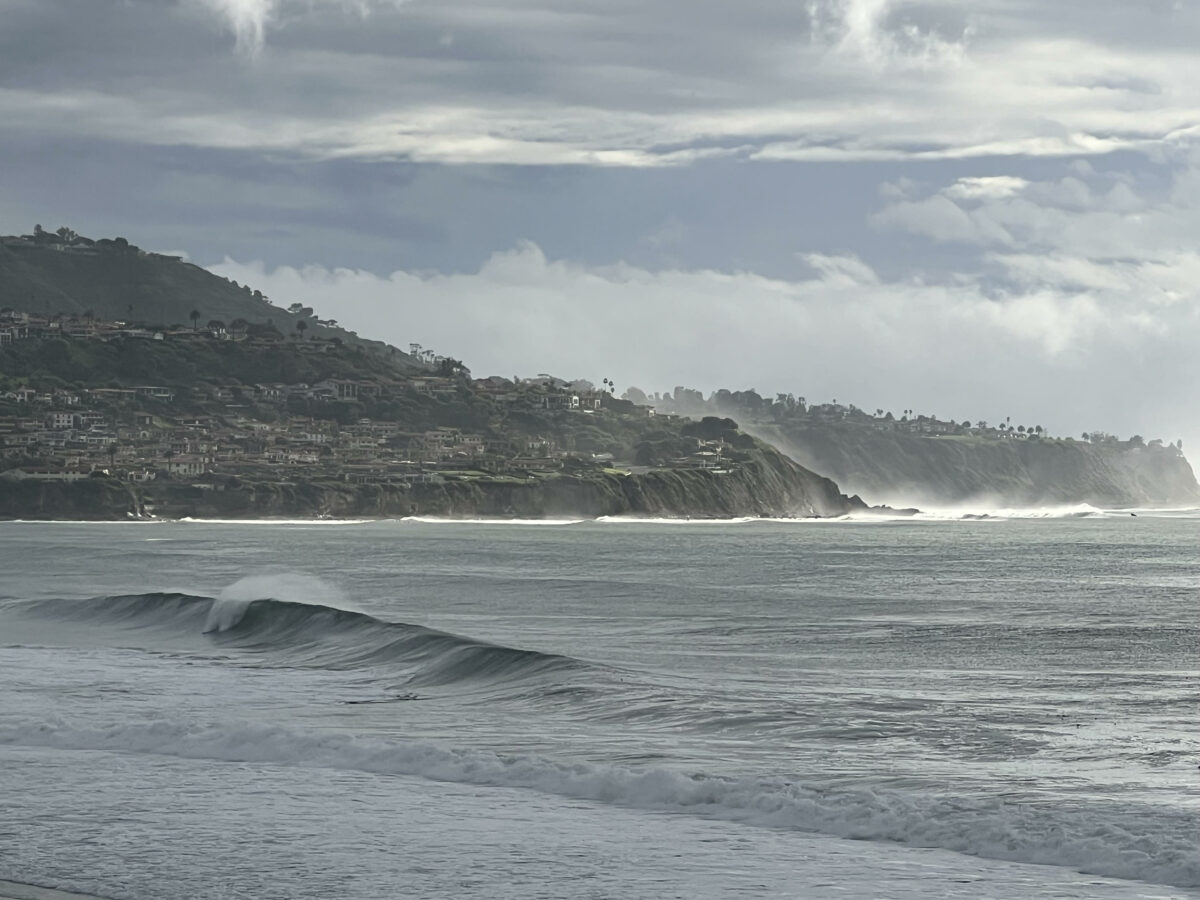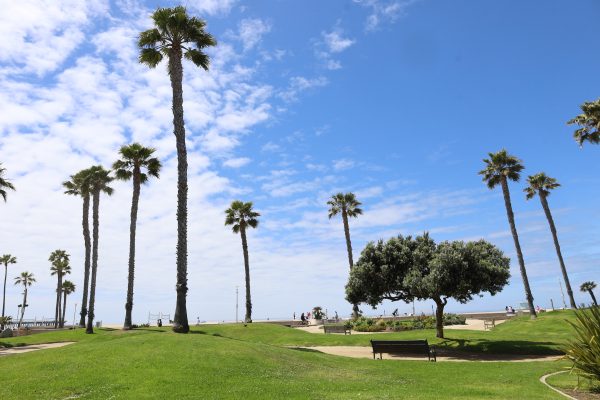Dark tides
A trail of city hall emails seems to lead nowhere
by Raymond Dussault
I was assembling a cocktail when my cell phone startled me with a sudden ding. I looked down. A message flashed on and disappeared.
“Are you alive?” I read in the pop-up window.
I finished what I was doing: pouring two ounces of bourbon, an ounce of OJ and a splash of simple syrup into a shaker with cracked ice. I shook it like a shake weight and poured it over ice. I topped it with sparkling water and a slice of orange.
I lifted the glass and toasted my empty apartment with “Orange You Glad It’s Happy Hour.” I took a sip. It was good. The perfect drink for sunsets, which I hoped to be enjoying soon.
I opened my phone. The text was from an ex-girlfriend.
“Much to the dismay of local politicians and the delight of bartenders and creditors alike, I am, against all odds, alive.”
The phone dinged again.
“I need your help. Can you meet me where I met you? Tonight. Midnight.”
Twenty-ninth and Strand. We met at the Deuce-Nine volleyball tournament. Not an encounter I’d soon forget. An odd time and place for a rendezvous.
“It’s important, Brendan. Please be there. And reasonably sober.”
I took the cocktail and walked out of my ADU behind my landlord’s house. They were traveling, so I walked through their patio and turned west toward The Strand. I leaned against a low wall, watching bikers, runners, and walkers as the sun set. The horizon was clear, with Catalina to the south and Malibu up north. The sun flared as it touched the Pacific. Later, I made another cocktail and read Amor Towles until 11:30. At 29th Street, I sent three texts and waited until 1 am. Emily never showed.
The sun was barely up the next morning and I was making coffee when my cell phone rang. It was Emily. I put it to my ear while I poured a cup and dropped in a little kick.
“I was there.”
“I know. I’m sorry,” she said. I could hear her breath. “I’ve been talking to someone at the Hall,”
Emily’s uncle, Walt Harrison, had founded the South Bay Times in the 1970s. He had old school ideas about what being a newsman meant. Those ideas hadn’t made him a favorite of local officials. Somehow, even as the Internet and changing mores swallowed larger and larger chunks of his bottom line, he kept the paper alive. When her uncle died, Emily stepped in, thinking she could grow it with millennial ideas and hard work. It was still a struggling concern. Every time she printed even mild criticism of local government, they threatened to pull the notices that kept the paper alive.
“She’s dead. They found her on Rat Beach. It’s probably already hitting the socials.”
We met on the bluff above Rat Beach. The view was haunting when you knew what was under the green canopy surrounded by cop cars. Given the name, you might expect a rodent infestation, but it really meant, “Between Redondo and Torrance.” It was the last flat sliver of beach before the land lifted the wealthy up to the heights of Palos Verdes.
“I was supposed to meet her before you last night. She never showed. Monroe called me before the sun was up.”
Detective James Monroe. The only local left after Chief Adams’ department purges. It’s hard to get rid of someone whose family has owned a fourth of the town for nearly a century. I turned to look at Emily. A tiny woman with a big heart and a stubborn streak. I couldn’t see her blue eyes under the Dodgers cap and dark sunglasses. I tried to put my arm around her shoulders. She pulled away.
“Don’t do that,” she said. One finger wiped under the rim of the sunglasses.
“Who is it?”
As Emily told her story, the wind picked up and pushed us off the bluff. We sat in my Mustang while I listened.
“She had emails. Between Mayor Hayes, Russo and Cortez, going back years. At first, they were just anonymous PDF dumps. When I didn’t publish them, she contacted me. She said she thought she was being followed.
“Did you know Angela? Angela Lindell?”
“I know who she is. Was.”
Angela Lindell was legacy staff. A holdover from before Russo started packing the Hall with overpaid cronies recruited from Huntington Beach. Russo had been a Council Member in Huntington, until he lost an election when his affair with a local judge and a DUI crash torpedoed his political aspirations. Angela, who grew up in nearby El Segundo, resisted his changes that threatened the small-town vibe.
When Russo shoehorned a new Assistant City Manager position into the city budget, Angela applied. Instead, Russo brought in his previous assistant from Huntington and dropped a salary on her more commensurate with his own position. With Mayor Hayes’ approval, Russo’s salary jumped as well.
Emily glanced at her Apple watch.
“I have to go. I’m meeting Monroe in an hour.”
I felt a pang of jealousy. Emily had dated the detective briefly when we broke up.
“Brendan, it’s not fair to ask, but I haven’t gone through Angela’s emails. She was supposed to show me the ‘smoking guns’ last night. Can you look through them today?
She suggested we meet at the Pen.
The Bull Pen was a good choice. Old school SoCal with high-backed, red leather booths. It afforded privacy and, being outside Hermosa, there was less chance of being recognized.
Emily got out and walked away. If I said I didn’t watch, I’d be a liar.
The emails took minutes to download and hours to read. I paired the drudgery with a six-pack of Pacifico and made notes on a legal pad.
The emails revealed Russo’s push for new positions and bloated salaries. They exposed Mayor Hayes’ arrogance and hair-trigger temper. Anyone at a council meeting had seen it: the retired Army lawyer, wound tight as barbed wire, snapped at the slightest criticism. His fragile ego, once shielded by rank, was ill-suited for politics.
I brought the notes to the Bull Pen and picked a booth with a view of the door. Light flooded the dark dining room as Emily entered. Her Hawaiian-print sundress was briefly see-through until the door shut. When she reached the booth, I realized I hadn’t been breathing. She slid in and tucked some dark hair behind one ear.
“Monroe said the Sheriffs are investigating Angela’s murder as a sex crime. Her jeans were partially down. She was strangled,” Emily said. “I never bought into your conspiracies. I don’t believe in coincidences either.”
I shuffled my notes.
“If this is all she knew, there’s nothing worth killing someone. Might be embarrassing to them. Might cost Hayes the next election. Might not. It wouldn’t cost Russo his job.”
I watched Emily deflate, frustration seemed to settle in her shoulders.
“I need a drink,” she said.
I walked to the bar to order. When I came back, Emily was reading my notes.
“No conspiracy?”
“As someone said, ‘You don’t need a formal conspiracy where interests converge.’ Russo and Hayes share goals, mostly about money and power.’”
I stopped for a moment, recalling an incident I’d heard about, when Hayes’ son was called out on a baseball play. They say it took several men to keep him from striking the ref.
“Hayes has got a temper but murder?”
We ordered dinner and more drinks. Neither of us had known Angela personally, so it didn’t hit as hard. By the end, we were laughing at old memories. When we stood up, Emily swayed into my hip. I caught her weight with my arm around her shoulders. She didn’t pull away.
“I don’t want to be alone tonight,” she whispered. I guided her to my car and took her home. During the drive, I noticed a pair of headlights that mimicked our every turn. They disappeared when I turned on Emily’s street.
I woke thirsty from the alcohol and slipped from bed. At the stairs, I saw a shadow move across the living room below. I looked around but saw nothing in the dim room. The house was quiet. I stepped off the last step and turned towards the kitchen. Something heavy slammed into my shoulder blades. The impact knocked me to the ground. I scrambled away as the baseball bat missed on the attacker’s next swing. I rolled over and pushed away as Mayor Hayes loomed over me, cocking the bat for another swing.
Loud booms echoed in the house. Hayes’ dark shape still loomed but his arm slumped. The bat slipped from his hand. He had a surprised look on his face. Blood oozed from holes in his chest. His body seemed to fold to the floor. I looked up at Emily on the balcony holding a pistol.
“Uncle Walt never liked that bully,” she said.
Honorable Mention – Limited visibility
A flight plan goes amiss, to the benefit of two lobster divers
by Don Ruane
5 a.m. March 1944.
“Do you think they forgot about us, or is this payback for leaving the gate late?”
Los Angeles Airport is under a heavy fog advisory, and Runway 16 has been activated. 16 is a north — south stretch of asphalt that allows take-offs and landings over the South Bay when visibility over the ocean is impacted enough as to not give the pilots a horizon line.
The crew aboard the DC-4 were positioned at the north end of the Field, facing south. They were certain the tower had forgotten about them. The fog was creating almost zero visibility, so the crew couldn’t see the tower and vice versa. They meant to radio check with the tower but were momentarily distracted.
The Aero First officer was the first to say what the other two crew members were looking at.
“Did you see that, wonder what kind of bird that is? The flight engineer said, “Looks like a heron. They’re supposed to bring good luck to travelers and sailors. Sometimes they’ll follow us down the taxiway to our holding area and get directly behind the props. The thrust being released makes it look like they’re flying stationary, it’s hilarious.”
The Captain added, “Yea, they’ll sit near the edge of the runway, the noise from the engine will cause the field mice to stick their head out of the ground to see what the commotion is all about, and the heron will reach down and just grab it.”
Aero California was founded and named by a couple of former Pan Am pilots, who wanted to give props to the Spanish influence of Southern California, with destinations such as San Diego, Santa Barbara, and Los Angeles. This particular DC-4, Flight 326, christened the “Clipper Channel Islands,” was late leaving the gate due to several late arriving passengers. One such person was a middle aged woman who stopped at the Mutual of Omaha counter to take out a $100,000 flight policy.
Another late arrival was a special bank courier, briefcase handcuffed to his wrist. He had purchased a last minute ticket with his own cash. This didn’t raise any suspicion because the bank does not tell couriers their destinations until just before departure time.
Since the start of World War II, there had been a mandatory blackout over the Southern California coast, which includes airplanes and airports. Anything in the air was suspect, and military air controllers had to be kept informed of all movements so delays on takeoffs were common.
“Alright guys, none of us have a lot of experience with this southerly route, and we will most likely have no landmarks, so here’s what we’re gonna do. As soon as we’re off the ground, we’re gonna be at full throttle. We’d like to clear the Standard Oil Refinery by 500 feet. Air regs say we need to clear the residual area of Manhattan by 1500 feet, but that’s not gonna happen, I wanna do a gradual climb out, 1500 ft will be too steep, so it looks like we’re going to be waking up the rich people. Our charts say we should turn right over Torrance Beach, but if we see an opening, any break in the clouds, I’d like to use that opportunity to get out over the bay.”
Over the radio came the green light, “Aero 326, you’re cleared for takeoff.”
The Captain got on the PA to let the crew and passengers know they were ready to go and to make sure that seat belts are secure.
The DC 4 had a confident roll down the runway despite not being able to see beyond 20 feet ahead. The call to rotate was made and the nose of the plane lifted into the mist. The back half of the plane was following suit when one of the female flight attendants ran into the cockpit and yelled, “We have a problem,” followed by a male who said, “I am the problem.”
The late arriving bank courier with a briefcase secured to his wrist now had a gun pointed at the crew. “I don’t want to hurt anyone, I need you to turn out to sea.” He pulled out a marine chart from his briefcase and said, “I need you to fly over these coordinates, there’s someone waiting for me.”
“I took some money from the bank, let’s say a lot of cash, and by 8 a.m. today they’re gonna realize it’s missing. I plan on being on my way to Mexico by then. You have a parachute in the back, I know, I’ve seen it many times, I’m gonna need to borrow it. Also, Captain, I’m gonna need you to release the override lock on the rear door. Do you understand?”
Both the pilot and first officer acknowledged the request, The Captain added, “I’m gonna have to call the LA tower and tell them we’re having an issue.”
“No you don’t,” was the response. “They’ll see you on the radar you’ve gone off course. I’ll be out of your life in a few minutes. Now, Captain, please release the rear door lock. I will tell your passengers to move towards the front of the plane. As I’ve said, I don’t want to hurt anyone.”
The courier walked back through the cabin and motioned everyone forward. Once the pilot saw that no one else was in the back, he pushed a red button, located level with his knee. The airliner was on a slight right turn almost at the coast line when the back door flew open. At an altitude of 1,000 feet, nothing was being sucked out of the plane, but noise from the engines were no longer buffered by the fuselage, and the open door allowed the fog bank to enter the cabin.
If it wasn’t wet and cold, one would have thought the DC4 had filled with smoke.
The rapid change in the environment caught the courier off guard. The fog was so thick inside he couldn’t find the parachute. Also, the woman who bought the flight insurance policy and who didn’t want to be lost in the fog, went into fight or flight mode. She ran up behind the courier and pushed him out the door. There was a muffled fading scream that everyone heard. As the scream went silent, the lone passenger from the back walked towards the flight deck to announce that the problem had been resolved.
The attendants made a quick passenger count and determined only one person was missing.
The first officer made an emergency call on the radio saying that there was a situation, one passenger has fallen out of the plane and the plane needed to return to LA. The request was approved with the caution that the crew was on its own to locate the airport because the runway lights were off.
Later that morning, a report came in that two guys spearfishing for lobster at a depth of 60 feet in the Redondo Submarine Canyon heard a loud splash, a sound divers don’t ever want to hear. The two quickly headed up to the surface, only to be met by a fully clothed man who was sinking. The divers grabbed the limb of the man and brought him close to their boat.
The sea scavengers were waiting nearby, flying low, looking for bait scraps to snack on. Seagulls are more passive than the herons. This morning, one lone heron landed on the swim step of the lobster boat, and contorted his neck to get his beak into the damaged briefcase attached to the body. His head was in there a good three to four seconds, before surfacing with a wad of cash in his mouth. The stunned fishermen motioned a trade; the money for a week’s worth of salmon scraps. The heron released the cash.
The body was dragged onto the boat and brought back to the Redondo dock. Upon arrival, one of the divers made a quick trip to his car while the other used a pay phone to call for help.
The Coast Guard had already been notified by LA Airport of a possible victim in the water. An ensign arrived at the dock to see what was up. His notes stated that two fishermen discovered the body, and brought him in. A wallet contained ID cards and some cash, a briefcase which was slightly torn, possibly damaged from the fall, was empty. ER











